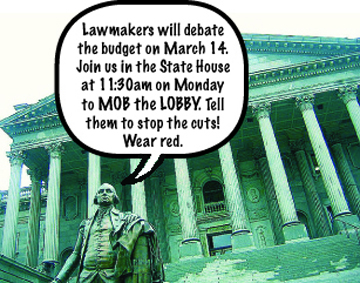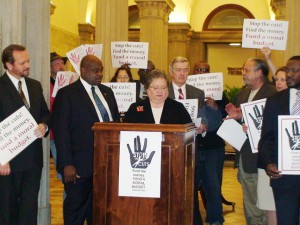Dr. Holley Ulbrich
Senior Scholar, Strom Thurmond Institute
A budget is a moral document. It expresses our values and our priorities as South Carolinians. It reminds us that each of us, four million plus South Carolinians, has needs to be met and gifts to offer the world.
One of our most deeply held American values is justice. We try to do that work of justice and compassion as individuals and through congregations and other private organizations. But the task is enormous. These scattered and individual efforts are not enough. Fifteen percent of South Carolinians lives in poverty—the 9th highest rate in the country.

Our underfunded schools are failing to develop our children’s talents and prepare them to become self-supporting, contributing members of society. We are not taking on those reciprocal responsibilities to one another as fellow citizens of South Carolina. The budget is an expression of our obligations to one another, and at present our budget demonstrates a lack of commitment, a failure to pay more than lip service to our shared values.
To treat everyone justly and fairly, we need to provide them with both freedom and opportunity. Freedom is not just freedom to, it is also freedom from. The four freedoms—freedom of speech and religion, freedom from want and fear—are all essential to human flourishing. Our children will not have that freedom and opportunity without providing them an adequate education for a demanding 21st century economy.
Those who cannot earn enough on their own—the disabled, the sick, the elderly, the children in single-parent homes where working mothers can’t earn enough to meet their needs—do not have freedom from want and fear, or opportunity to escape from poverty. Prisoners who are overcrowded and lack access to exercise and education have little or no opportunity to re-enter society as productive human beings leading meaningful lives.
The failure to maintain the state’s infrastructure, especially transportation infrastructure, will make it increasingly difficult to attract and retain business firms to provide employment opportunities for our workers, who still suffer from one of the highest unemployment rates in the nation.
Yet our state General Fund spending per person, adjusted for inflation, is lower than it was 10 years ago-$1,156,compared to $1,229 in the 1999-2000 budget. The 2010 budget per person was at the 1984 level in constant dollars. We are asking our teachers, our prisons, our colleges and universities, our health services and public safety officers to do more with less, and do it with 21st century technology.
Is there another way? Yes.
The budget is a moral document not only on the spending side, which displays our priorities for all to see, but also on the revenue side. How much are we able and willing to contribute to meeting the needs of our fellow citizens? By any measure, our state and local tax system has failed to reflect our shared values of justice, of freedom, of compassion, and of opportunity. Instead, we have focused on tax cuts and failed to update our antiquated revenue system, standing idly by while our tax base continues to erode.
Taxes are low in South Carolina, and getting lower. South Carolina ranks 47th out of 51 states (including the District of Columbia) in taxes as a percent of income and 51st in taxes per capita. Yet low taxes have not succeeded in the supposed goal of attracting and retaining industry, because business firms care about more than taxes. Business location studies show that firms care about an educated work force, an adequate transportation system, a consumer market that can afford to buy their products and services, and quality of life for the firm’s employees.
South Carolina’s sales tax system is eroding rapidly. One factor in that erosion is tax cuts over the last 10 years. Changes in the income tax that allow unincorporated business to file at the same 5% rate as corporations and eliminate the bottom bracket (which affects all taxpayers) on the individual income tax have cost the state more than $200 million a year. State-funded property tax relief has been a major drain on the state’s revenue.
The homestead exemption for the elderly and the original relief on the first $100,000 of owner-occupied property takes is one drain on state revenue. The shortfall in revenue from the extra penny of sales tax to fund additional relief to homeowners under Act 388 is a second source of drain on the General Fund- $124 million in the current fiscal year. Together, these three state-funded sources of property tax relief are reducing revenue available for public services by about $546 million a year. Added to the two income tax changes, these tax breaks just about cover the shortfall in the current budget.
In addition to the legislative changes above, there are some problems with the revenue system that slow the growth of revenue so that it cannot keep pace with growth of population and inflation. Growth of sales tax revenue lags behind growth of personal income, in part because South Carolina has failed to follow the lead of other states in responding to the change in how households spend their money. In 1970, 45% of consumer spending was for tangible goods, which is the base of our sales tax. Today that share has fallen to 30%.
The average state taxes 57 kinds of services; South Carolina taxes only 36. The sales tax base needs to be updated to reflect the change in how we spend our money, as the Tax Realignment Commission has recommended.
We also need to address updating our excise taxes and revenue losses from such tax breaks as the sales tax cap on cars, boats, motorcycles and airplanes.
The income tax also has some structural problems. Only about 40% of South Carolinians pay any income tax. Some of us are too poor to pay income tax, but some are too old. South Carolina has the most senior-citizen-friendly income tax in the nation, according to a Georgia State study a few years ago. A family of two adults over age 65 that can take advantage of pension provisions, Social Security and the age-related deduction could have an income of more than $60,000 a year before having to pay any income tax. There are also some 53 credits available to reduce one’s income tax liability.
Unlike spending, tax breaks never come up for a scheduled annual review. They just continue from year to year, eroding the revenue base that needs to be shored up in order to continue to fund essential public services. The covenant that South Carolinians have with each other includes not only the services that we wish to ensure for all citizens but also the commitment to pay for them. Our legislators need to look closely every year at tax provisions that may have made sense 10 or 20 years ago but are never subject to review and reconsideration.
This document prepared in collaboration with Dr. Holley Ulbrich, Senior Scholar, Strom Thurmond Institute; Alumni Distinguished Professor Emerita of Economics, Clemson University






